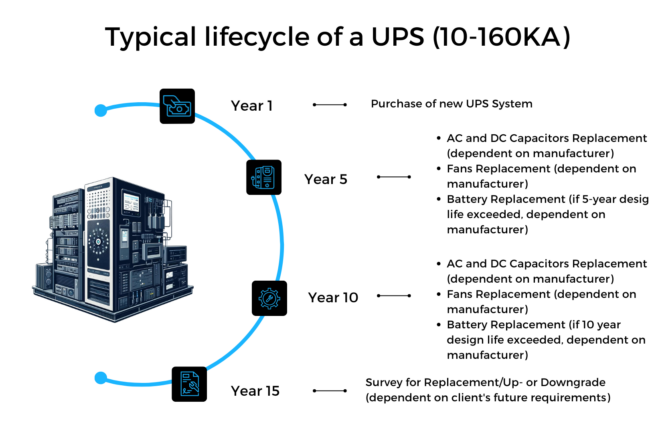When should you consider updating/upgrading your UPS system? Like any piece of technology, there comes a point where the cost of maintenance outweighs that of upgrading to a new device. On some occasions, this can be down to age, use, scale and innovation. When it comes to the world of UPS, we’re frequently asked:
- How long does a UPS last?
- How can you determine when it’s time for a new unit?
Before, we dive in it’s important to understand that each UPS system is distinct, shaped by its design and the manufacturer’s specific operational guidelines. Engaging with certified engineers to craft a tailored maintenance strategy is critical. Such professional guidance ensures that your organisation’s power supply remains robust and uninterrupted. These experts play a crucial role in determining whether your UPS system requires an upgrade or if ongoing maintenance will suffice.
Determining when it makes sense to replace your UPS system can depend on various personal factors unique to your site, needs, and particular unit. UPS systems are highly sensitive pieces of equipment and include several delicate components such as batteries, capacitors, circuit boards, and more, which can all be repaired or replaced.
Below, we’ll explore a few ways to determine whether your UPS unit still has a few more good years left and what the stages of maintenance and repairs you should consider before looking to upgrade.
When should you consider replacing your UPS system?

First signs your UPS system needs replacing
Before considering anything else about your UPS unit and requirements, it’s valuable to review the following key factors. If your UPS unit is experiencing any of these, it’s likely time to begin searching for a new unit.
-
If it’s been 10-12 years since your last UPS purchase
While UPS units are generally designed for longevity, they will experience wear from usage and environmental factors. Once your UPS ages past its twelfth year, it’s time to start looking for a new unit.
Many systems can last more than 15 years with regular maintenance checks throughout the year, relying on an older unit for mission-critical equipment may pose risks. Consider whether your parts are still supported by the original equipment manufacturer (OEM) as discontinuation may lead to sourcing difficulties.
Planning for replacement at years 10-12 allows you plenty of time to research your options and speak with the right providers without risking your equipment or data.
-
Your business is growing
As your business evolves and scales, so will your critical load needs. You’ll likely find that your UPS system can no longer meet these increasing load requirements or if it’s too big due to service reductions – if that’s the case it’s time for a replacement.
Your UPS service provider will help you to understand load and maintenance trends and offer the best optimisation options.
-
Your existing unit is obsolete
Outdated UPS systems elevate the risk of downtime. Given the swift pace of technological advancement, your UPS might become obsolete within just five years. If your requirements surpass the capabilities of your current unit, it’s prudent to contemplate transitioning to a more modern system. Consistently assessing and upgrading UPS units helps minimise the threat of obsolescence and guarantees dependable power protection.
-
A more energy-efficient option
Newer UPS units are notably more energy-efficient compared to those manufactured over a decade ago. Upgrading to these modern units can lead to significant savings in annual operating costs and reduced utility bills. Moreover, newer UPS systems often come with warranties, lessening the need for full-service maintenance contracts and reducing overall operation expenses. Considering these factors, upgrading your UPS not only meets evolving power protection needs but also supports sustainability efforts.
Choosing the right upgrade for your business: How to choose the right UPS for you
The most crucial consideration when selecting a UPS is to choose one that best matches your requirements. Determine your current load requirements, expected load fluctuations, installation location, environmental factors, energy efficiency importance, and uptime requirements before starting the shopping process. Consult with a UPS provider to understand critical power needs better and choose the right UPS system.
How critical are your loads?
Total the load and draw requirements of all connected equipment and compare it to your UPS’s wattage capabilities. If your UPS is loaded between 25-80% of its total capacity, you’ve likely implemented it well. However, if it exceeds 80%, you need a higher capacity unit. Conversely, if the load is less than 25%, consider a more suitable UPS to avoid wasting energy and money.
It’s important to bear in mind that UPS systems are inherently unique, and this guide serves as a general framework for maintenance. To ensure optimum performance and longevity of your UPS unit, we strongly recommend consulting with an engineer to develop a bespoke assessment and maintenance plan tailored to your specific needs and circumstances. Engaging with professionals in this way will help you derive the most value from your UPS system, tailored precisely to the unique demands of your site.
At BCL Power, understanding your UPS system needs is our expertise. From installation to ongoing maintenance, we ensure your UPS and battery services are covered. Contact our team for UPS system requirements, quotes, or more information. Get a free site visit today.

